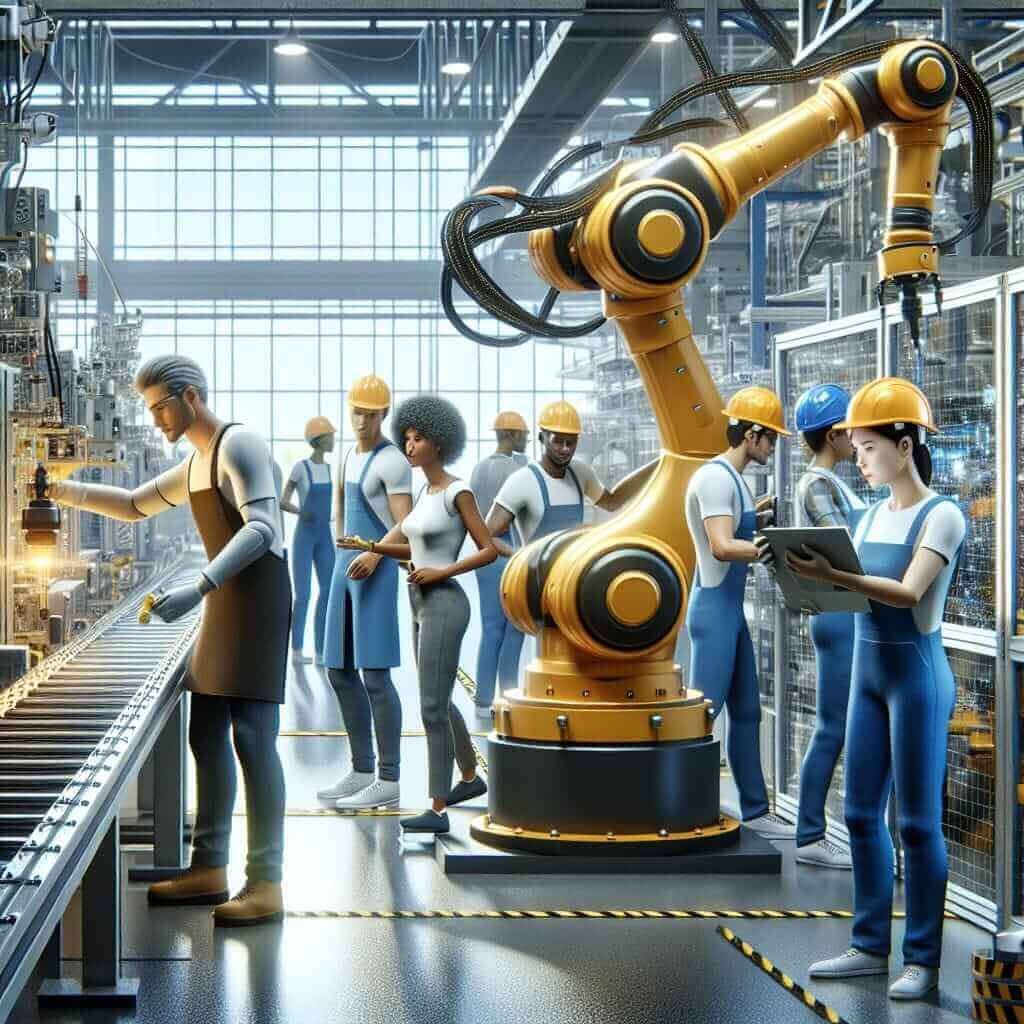In the IELTS Reading section, candidates encounter passages and questions that test their ability to understand, interpret, and analyze written English. Having awareness and practice on current and relevant topics can be beneficial. One such relevant and contemporary topic is “How is AI transforming the manufacturing industry?” This subject has seen increasing prominence in IELTS Reading passages due to its real-world applicability and timeliness. Understanding this topic can provide a competitive edge as it covers technological advancements that are reshaping industries globally, potentially making it a frequent subject for IELTS Reading passages.
Nội dung bài viết
- Practice Reading Passage: How AI is Transforming the Manufacturing Industry
- The Role of AI in Modern Manufacturing (Easy Text)
- Questions
- Multiple Choice
- Identifying Information (True/False/Not Given)
- Matching Information
- Summary Completion
- Answers and Explanations
- Common Mistakes and Tips
- Vocabulary
- Grammar Tips
- Advice for High Reading Scores
Practice Reading Passage: How AI is Transforming the Manufacturing Industry
The Role of AI in Modern Manufacturing (Easy Text)
Artificial Intelligence (AI) is revolutionizing the manufacturing sector by enhancing production efficiency, improving quality control, and enabling predictive maintenance. Traditionally, manufacturing processes relied on human labor and basic automation, which often led to inaccuracies and inefficiencies. Today, AI integration in factories has created smarter manufacturing systems capable of self-optimization and improved decision-making.

AI technologies, including machine learning and computer vision, are pivotal in developing advanced robotics that can perform sophisticated tasks with precision. These robots can collaborate with human workers on the production floor, leading to increased productivity and reduced error rates. Furthermore, AI-driven predictive maintenance can foresee machinery failures, thus minimizing downtime and saving costs.
The integration of AI also aids in quality control through real-time monitoring and analysis. Traditional quality inspection methods are often time-consuming and prone to human error. AI systems, however, can rapidly evaluate products using intricate algorithms, ensuring that only the highest quality goods reach consumers.
Moreover, AI enhances supply chain management by analyzing vast amounts of data to predict demand, optimize inventory levels, and reduce wastage. This comprehensive approach leads to a more responsive and efficient production process that can adapt to market fluctuations.
Questions
Multiple Choice
-
What is one of the main benefits of integrating AI into manufacturing?
A. Increased human labor
B. Enhanced production efficiency
C. Decreased product quality
D. Longer downtime -
AI technologies such as machine learning and computer vision help in:
A. Increasing manual labor
B. Reducing precision
C. Developing advanced robotics
D. Slowing down production
Identifying Information (True/False/Not Given)
-
AI has made traditional quality inspection methods more time-consuming. (True/False/Not Given)
-
AI-driven predictive maintenance can foresee machinery failures. (True/False/Not Given)
Matching Information
- Match the following uses of AI in manufacturing with their descriptions:
a. Quality Control
b. Supply Chain Management
c. Predictive Maintenance
i. Foresees machinery failures
ii. Real-time monitoring and analysis
iii. Analyzes data to predict demand
Summary Completion
AI integration in manufacturing has led to more __ (6) systems capable of self-optimization. Advanced __ (7) can work alongside human workers, increasing productivity and reducing __ (8).
Answers and Explanations
-
B – Enhanced production efficiency
- One of the primary advantages of integrating AI in manufacturing is to boost production efficiency by optimizing processes.
-
C – Developing advanced robotics
- Machine learning and computer vision are crucial for creating sophisticated robotics that enhance manufacturing.
-
False
- AI has actually streamlined and accelerated quality inspections, contrary to making them more time-consuming.
-
True
- AI-driven predictive maintenance systems can indeed anticipate machinery failures.
-
- Quality Control: ii. Real-time monitoring and analysis
- Supply Chain Management: iii. Analyzes data to predict demand
- Predictive Maintenance: i. Foresees machinery failures
-
smarter
-
robotics
-
error rates
Common Mistakes and Tips
- Not skimming the text: Always skim the passage first to get a general idea of the content. This will help in locating the specific parts when answering questions.
- Misinterpretation of keywords: Pay attention to keywords in both the passage and questions. Sometimes similar-looking words or phrases can lead to incorrect answers.
- Overlooking details: Ensure you understand the descriptive details and context provided, as they can significantly impact the answers.
Vocabulary
- Revolutionizing [v.] /ˌrɛvəˈluːʃənˌaɪz/: Significantly changing or innovating a process or system.
- Predictive [adj.] /prɪˈdɪktɪv/: Relating to the ability to predict future outcomes based on data.
- Optimization [n.] /ˌɑːptɪmɪˈzeɪʃən/: The action of making the best or most effective use of resources.
- Downtime [n.] /ˈdaʊntaɪm/: The period during which a machine is out of action or unavailable for use.
Grammar Tips
- Use of Relative Clauses: “AI integration in factories, which has created smarter manufacturing systems, is pivotal.” This clause provides extra information about AI integration.
- Passive Voice: “AI systems can rapidly evaluate products.” This emphasizes the action rather than who is performing it.
Advice for High Reading Scores
To excel in the IELTS Reading section:
- Practice Regularly: Familiarize yourself with different types of passages and questions.
- Build Vocabulary: Enhance your understanding of academic vocabulary and technical terms.
- Improve Skimming and Scanning Skills: These techniques help in quickly locating information in the text.
- Time Management: Practice under timed conditions to improve your speed and accuracy.
Continuously engaging with current and practical topics, such as the impact of AI on the manufacturing industry, can significantly aid in achieving higher scores in your IELTS Reading exam.